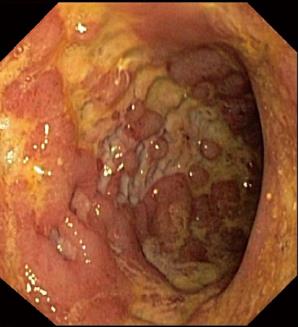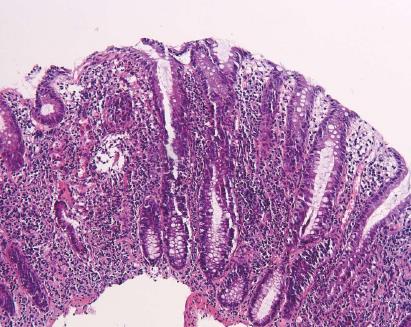Published online Aug 6, 2013. doi: 10.4292/wjgpt.v4.i3.80
Revised: April 15, 2013
Accepted: May 18, 2013
Published online: August 6, 2013
Processing time: 215 Days and 23.4 Hours
Administration of ipilimumab, a cytotoxic T-lymphocyte associated antigen-4-blocking monoclonal antibody, leads to enhancement of the anti-tumor T-cell response and as a result shows a significant survival benefit in metastatic melanoma patients. Therefore patients are currently receiving this promising therapy as a second-line strategy. Unfortunately, by activation of the T-cell immune respons, ipilimumab therapy may lead to an unwanted induction of different autoimmune phenomena. Diarrhoea and colitis occur in up to one third of patients. Here we present a case of ipilimumab induced ileocolitis which was successfully treated with infliximab, an anti-tumor necrosis factor monoclonal antibody, after corticosteroid therapy failure. Although formal trials are lacking, recently publicated series suggest that infusional therapy of infliximab is effective in ipilimumab induced ileocolitis.
Core tip: This paper presents a case of ipilimumab induced ileocolitis which was successfully treated with infliximab, an anti-tumor necrosis factor monoclonal antibody, after corticosteroid therapy failure. Although formal trials are lacking, recently publicated series suggest that infusional therapy of infliximab is effective in ipilimumab induced ileocolitis.
- Citation: Slangen RM, van den Eertwegh AJ, van Bodegraven AA, de Boer NK. Diarrhoea in a patient with metastatic melanoma: Ipilimumab ileocolitis treated with infliximab. World J Gastrointest Pharmacol Ther 2013; 4(3): 80-82
- URL: https://www.wjgnet.com/2150-5349/full/v4/i3/80.htm
- DOI: https://dx.doi.org/10.4292/wjgpt.v4.i3.80
Ipilimumab administration has shown a survival benefit in metastatic melanoma patients, therefore more patients are likely to receive this therapy as a second-line treatment. Unfortunately, ipilimumab therapy may lead to an unwanted induction of autoimmune phenomena. Here we present a case of ipilimumab induced ileocolitis successfully treated with infliximab after corticosteroid therapy failure.
A 53-year-old man with a medical history of metastatic melanoma (metastasized to lungs, lymph nodes and pericardium), was presented at our endoscopy ward because of highly frequent, non-bloody diarrhoea without fever. His medication consisted of morphinomimetics and haloperidol. Four weeks earlier, he started with ipilimumab (3 mg/kg body weight), a fully humanized IgG antibody against the Cytotoxic T-lymphocyte associated Antigen-4 (CTLA-4), of which he had received two administrations. His diarrhoeal complaints had started one week after the second infusion. Routine stool cultures, including Clostridium difficile, were negative. A colonoscopy was performed, which showed a patchy colitis with deep, confluent Crohn-like ulcerations (Figure 1). Histopathological examination demonstrated a severe cryptitis with a few abscesses. No granulomas or architectural changes were seen (Figure 2). Furthermore, cytomegalovirus infection was excluded. A computed tomography-scan was performed, showing diffuse thickening of the wall of the entire colon and terminal ileum. A diagnosis of ileocolitis associated with anti-CTLA-4 treatment was made. Our patient was treated with prednisolon (1 mg/kg) for 10 d without beneficial clinical effect. For that reason, intravenous infliximab therapy was initiated (a chimeric IgG antibody against tumour necrosis factor-α) in a dosage of 5 mg/kg body weight (at week 0 and 2)[1,2], after two administrations his diarrhoeal complaints resolved completely.
Two recent studies demonstrated that ipilimumab therapy improves survival of patients with metastatic melanoma[1,2]. Unfortunately, blocking of CTLA-4 by ipilimumab[3], may lead to an induction of a variety of autoimmune phenomena. This may comprise inflammation of the gastrointestinal tract, leading to diarrhoea and colitis being reported in up to 31% of patients[1].
As ipilimumab administration has shown a survival benefit in metastatic melanoma patients[1,2], more patients are likely to receive this therapy as a second-line treatment. Moreover, trials of ipilimumab are ongoing in metastatic non-small cell lung cancer[4] and in castration-resistant metastatic prostate cancer patients[5]. Therefore, it is to be expected that ipilimumab induced colitis will be encountered more often.
So far, by clinical judgement, corticosteroids are most often prescribed as a first-line treatment for ipilimumab induced colitis. In prednison-refractory cases, infliximab has shown to be an effective second line treatment[6-9]. The beneficial administration of infliximab in these patients is underlined by our case.
| 1. | Hodi FS, O’Day SJ, McDermott DF, Weber RW, Sosman JA, Haanen JB, Gonzalez R, Robert C, Schadendorf D, Hassel JC. Improved survival with ipilimumab in patients with metastatic melanoma. N Engl J Med. 2010;363:711-723. [RCA] [PubMed] [DOI] [Full Text] [Cited by in Crossref: 10799] [Cited by in RCA: 12038] [Article Influence: 752.4] [Reference Citation Analysis (0)] |
| 2. | Robert C, Thomas L, Bondarenko I, O’Day S, M D JW, Garbe C, Lebbe C, Baurain JF, Testori A, Grob JJ. Ipilimumab plus dacarbazine for previously untreated metastatic melanoma. N Engl J Med. 2011;364:2517-2526. [RCA] [PubMed] [DOI] [Full Text] [Cited by in Crossref: 3331] [Cited by in RCA: 3447] [Article Influence: 229.8] [Reference Citation Analysis (11)] |
| 3. | Peggs KS, Quezada SA, Korman AJ, Allison JP. Principles and use of anti-CTLA4 antibody in human cancer immunotherapy. Curr Opin Immunol. 2006;18:206-213. [PubMed] |
| 4. | Reck M, Bondarenko I, Luft A, Serwatowski P, Barlesi F, Chacko R, Sebastian M, Lu H, Cuillerot JM, Lynch TJ. Ipilimumab in combination with paclitaxel and carboplatin as first-line therapy in extensive-disease-small-cell lung cancer: results from a randomized, double-blind, multicenter phase 2 trial. Ann Oncol. 2013;24:75-83. [RCA] [PubMed] [DOI] [Full Text] [Cited by in Crossref: 413] [Cited by in RCA: 497] [Article Influence: 35.5] [Reference Citation Analysis (0)] |
| 5. | van den Eertwegh AJ, Versluis J, van den Berg HP, Santegoets SJ, van Moorselaar RJ, van der Sluis TM, Gall HE, Harding TC, Jooss K, Lowy I. Combined immunotherapy with granulocyte-macrophage colony-stimulating factor-transduced allogeneic prostate cancer cells and ipilimumab in patients with metastatic castration-resistant prostate cancer: a phase 1 dose-escalation trial. Lancet Oncol. 2012;13:509-517. [RCA] [PubMed] [DOI] [Full Text] [Cited by in Crossref: 293] [Cited by in RCA: 291] [Article Influence: 20.8] [Reference Citation Analysis (0)] |
| 6. | Beck KE, Blansfield JA, Tran KQ, Feldman AL, Hughes MS, Royal RE, Kammula US, Topalian SL, Sherry RM, Kleiner D, Quezado M, Lowy I, Yellin M, Rosenberg SA, Yang JC. Enterocolitis in patients with cancer after antibody blockade of cytotoxic T-lymphocyte-associated antigen 4. J Clin Oncol. 2006;24:2283-2289. [PubMed] |
| 7. | Johnston RL, Lutzky J, Chodhry A, Barkin JS. Cytotoxic T-lymphocyte-associated antigen 4 antibody-induced colitis and its management with infliximab. Dig Dis Sci. 2009;54:2538-2540. [RCA] [PubMed] [DOI] [Full Text] [Cited by in Crossref: 98] [Cited by in RCA: 106] [Article Influence: 6.2] [Reference Citation Analysis (0)] |
| 8. | Lord JD, Hackman RC, Moklebust A, Thompson JA, Higano CS, Chielens D, Steinbach G, McDonald GB. Refractory colitis following anti-CTLA4 antibody therapy: analysis of mucosal FOXP3+ T cells. Dig Dis Sci. 2010;55:1396-1405. [RCA] [PubMed] [DOI] [Full Text] [Full Text (PDF)] [Cited by in Crossref: 82] [Cited by in RCA: 83] [Article Influence: 5.2] [Reference Citation Analysis (0)] |
| 9. | Minor DR, Chin K, Kashani-Sabet M. Infliximab in the treatment of anti-CTLA4 antibody (ipilimumab) induced immune-related colitis. Cancer Biother Radiopharm. 2009;24:321-325. [PubMed] |
P- Reviewers Matsuhashi N, Yan YT S- Editor Zhai HH L- Editor A E- Editor Ma S














